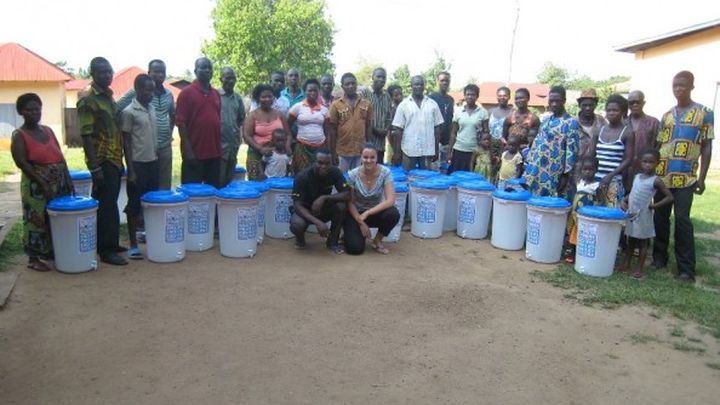
Water Filter & Education Project in Togo
Donation protected
Thank you for visiting my page! My name is Ariane Khalfa, and I plan to travel to Togo in the summer of 2014 to carry out two projects very dear to my heart, a water filter project, and an educational youth film club with a solar energy component. I am a French-American who grew up in the United States, France, and England. I studied Geography, French, and African Studies at Mount Holyoke College, where I focused on development and education in French-speaking Africa. One year after graduation, I now live and work in San Francisco, California. Visit my LinkedIn profile to learn more about my experience and career goals.
After a three-month, self-designed internship in French-speaking Togo, West Africa (map) in 2011 followed by two years of research, I identified health and education as the most important needs in the township I visited, and began building these two projects. I am launching this website on my birthday, because what I would like most this year is the funding and support needed to carry out these projects from beginning to end. The budgets for my water filter project and educational youth film club are $10,000 and $5,000, respectively. Combined, these projects are in need of $15,000. The two projects are integrated, comprehensive, and affordable. They will be locally led, and self-sustained. Both will reach a large population with continued expansion and provide local educational and leadership opportunities on every level.
Why am I interested in Togo and Francophone Africa?
I am drawn to Francophone West Africa because village and farm communities survive despite the constant struggle for basic necessities like food, water, shelter, and good health. Reading the blogs of Peace Corps volunteers in Togo, Benin, Burkina Faso, Mauritania, Rwanda, and others has made a lasting impression on me, and I became concerned about poverty at the most extreme level. These volunteers generally live in impoverished, rural communities where local families help each other in times of crises and communities collaborate to make important decisions, like what to do when the last well runs dry. Love and generosity are as valuable as gold in societies with little material wealth and where community members depend on each other for existence. In many of the villages, animals run free and houses are made from mud and straw; a large percentage of their food is locally produced, from staples like corn and cassava to local specialties like palm wine and Togo gin. I began studying the history, sociology, geography, economics, politics, and culture of West Africa, and received funding from Mount Holyoke College to design my own summer internship. May to August 2011 I traveled to Togo, a politically peaceful country, eager to learn about a culture different from my own, and built around values I admire.
All photos on this page were taken by me, Ariane Khalfa, in the summer of 2011 in the township of Agou-Yiboé, Togo.
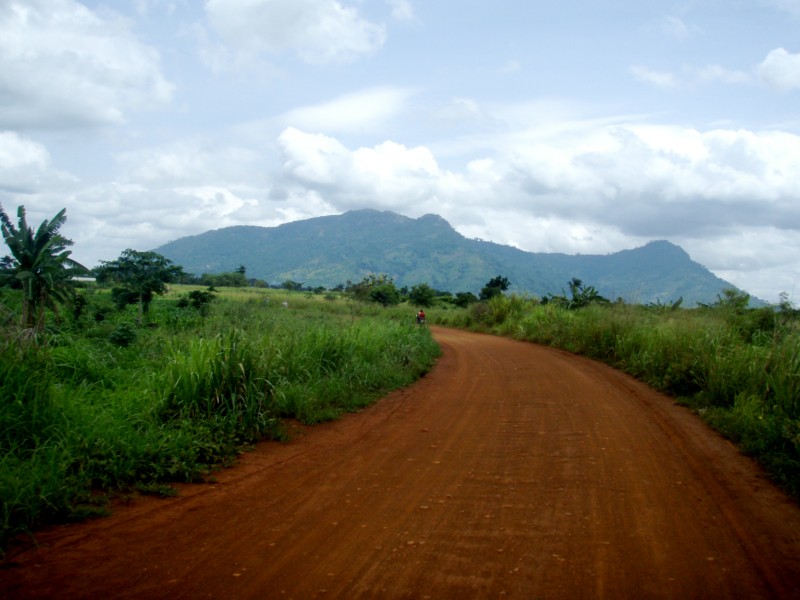
Photo taken from motorcycle on the road leading to Mount Agou.
My Research in the Township of Agou-Yiboé, Togo
I spent 3 months interning with the Center for Assistance to the Deprived and Orphaned (CADO), referenced in this article, a legally recognized Togolese non-profit and Non Governmental Organization (NGO), based in the remote, tropical village of Avedje at the foot of Mount Agou in southern Togo. I wanted to hear opinions and suggestions on local development initiatives from the most vulnerable members of the community, so I collaborated with a Togolese colleague from CADO, Alain Koku Degboe. Together, we designed a survey and interviewed 250 women in the township's 6 villages and 5 farms to determine family and community difficulties and the solutions they envisaged to bring them closer to their goals. The women's highest demand was to have clean drinking water (66% of 152 women interviewed, and 89% of all women from the 5 farms). Click here for a table of these results, to read a personal story about the conditions I witnessed, and for photos and more information about local water and sanitation conditions including waterborne illnesses in the region. This study led me to conduct further research and to finalize a 47-page thesis on education in Togo including a comprehensive community development plan for the township of Agou-Yiboé.
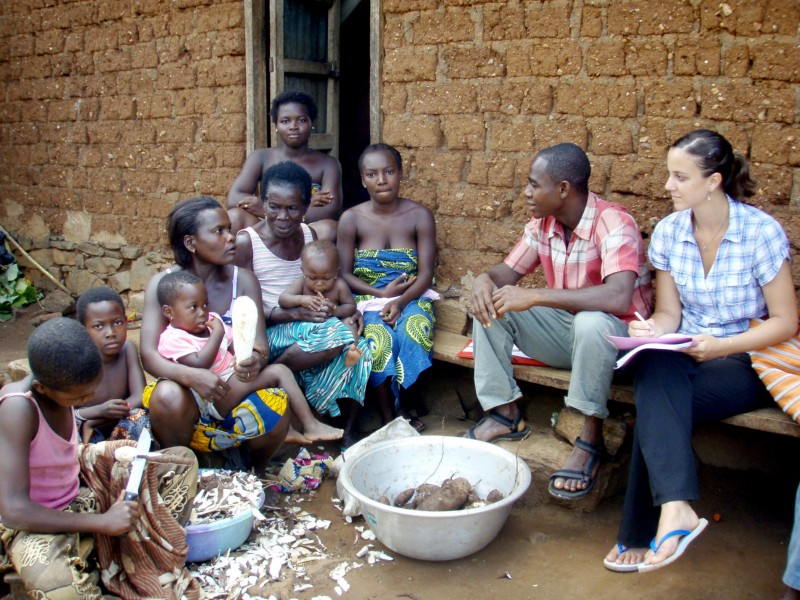
Interviewing women in the mountain village Blakpa. Sitting next to me is Alain Koku Degboe, my Togolese colleague and interpreter.
After finishing our surveys in 6 of the township's villages, we interviewed women in 5 remote farms where I witnessed a whole new level of poverty. The farms are much more difficult to access than the villages, and none of them have functioning wells. Instead, the farms rely entirely on water from the Zio River and small streams. Garbage, animal and human waste, and pesticides constantly pollute the river. Water around the riverbanks stagnates, increasing the spread of waterborne diseases and providing breeding grounds for mosquitoes.
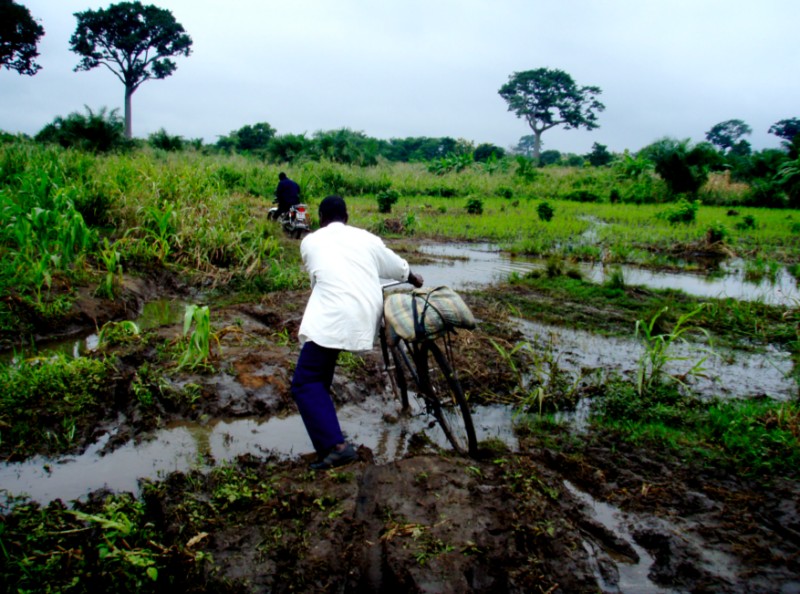
The swampy path from Avedje, worsened by the rainy season, on the way to Makoumavo, one of the farms.
For drinking purposes, women in the farms currently filter water from the Zio River with a piece of cloth in attempt to remove the largest dirt particles before consumption. However, for bathing, cleaning, and washing dishes, the water is left as-is. Parasitic diseases, particularly malaria, affect 78% of the population. The area's most severe health problem directly related to water and sanitation is diarrhea, sometimes to a deadly degree, and other illnesses such as trachoma, hepatitis A, typhoid, Guinea Worm, schistosomiasis, onchocerciasis, and several other parasitic diseases are common as well.
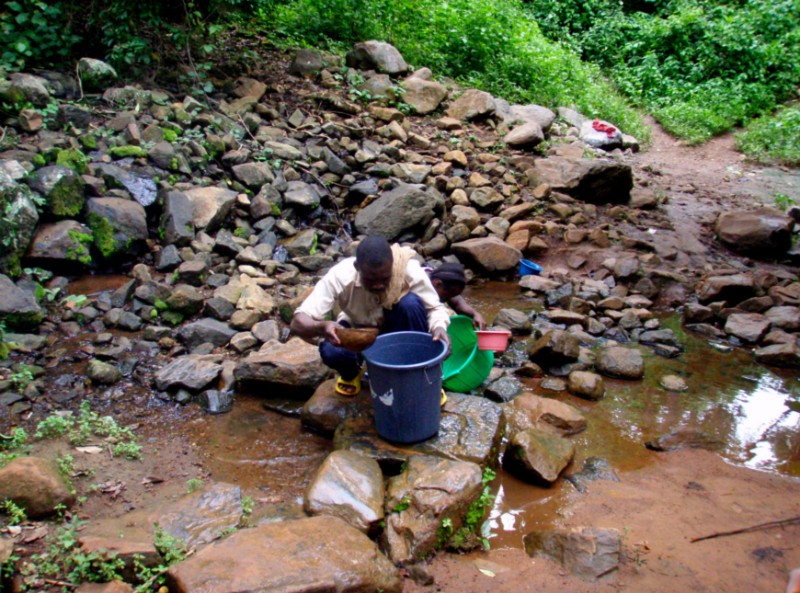
This small stream is a source of water for the village of Petsi.
Project #1 - Water Filter Project
Locally made ceramic water filters are presently the most immediate, affordable, and ecological solution to convert contaminated water into safe drinking water, help prevent diseases, and save the lives of susceptible children. $10,000 is needed to supply 300 locally made ceramic water filters to the 5 most remote farms in the township of Agou-Yiboe in Togo, West Africa. These filters will provide 300 households with safe, clean drinking water. The average household size in the Agou Prefecture is between 5.5 and 12 people. According to the most conservative population estimates for the farms, anywhere between 1,094 and 1,860 people would have access to these filters in the farms Donomade, Ananivikondji, Makoumavo, Zionou, and Makavo. Because of the communal-style living, if needed, two households may share each filter, thus resulting in more people having access to clean water. During our survey, an overwhelming majority of women expressed support for this project, and indicated willingness to contribute financially to a percentage of the cost of a filter. This contribution ultimately lowers the cost of fundraising while giving families ownership of their filters. While the families may be contributing toward a percentage of the cost of the filters, they will need assistance funding crucial transportation costs, border fees, events to raise awareness, distribution, training, and essential follow-up evaluations.
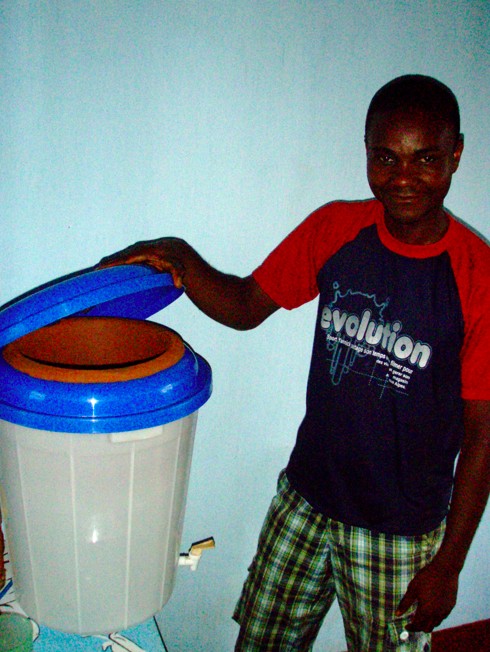
Bienvenu displaying one of PHW's original ceramic pot Kosim filters. PHW now distributes AfriClay filters.
The water filters are manufactured, sold, and distributed by Pure Home Water (PHW), a social enterprise and legally recognized non-profit based in Tamale, northern Ghana. Watch the video on PHW's website to learn more about why this filter is ideal. The filter consists of a locally produced ceramic pot, plastic safe-storage container, top ring, lid, tap, brush, instruction sheet, and one Aquatab. If correctly operated and maintained, it has a proven life span of 3-5 years. Volunteer members of the community including women and youth will be designated as key leaders to represent their village/farm and train residents in water filter use and maintenance. Click here for more information about the water filter's history and effectiveness, and logistics for transportation, distribution, and training.
Project #2 - Educational Youth Film Project
"One's mind, once stretched by a new idea, never regains its original dimensions." - Oliver Wendell Holmes.
In conjunction with the water filter project, I have designed a complementary education project, which has a smaller budget and the potential to generate a small income to sustain itself annually. The $5,000 would be an initial investment to jump-start the club, where regional African films and documentaries are screened in villages followed by facilitated discussions. These are francophone African-made films reflecting on similar hardship situations faced by communities in rural Togo. I have compiled a list of approximately 20 films from various African Studies classes, and will be consulting with African Studies and Film professors as well as seek suggestions from the public to revise the list. These films have educational value and provide new knowledge and a new perspective on the problems faced in the community. They have the potential to open minds, prompting villagers to think of creative and entrepreneurial solutions to their difficulties. This project is aimed at stimulating village dialogues and inspiring the youth to become leaders for catalyzing change in their communities during their summer school break. This is an opportunity for communities to be introspective and embrace their local traditions and values while adapting to the ever-evolving, globalizing world. For my thoughts on education in Togo, and to see photos of children in the township who would benefit from this program, click here.
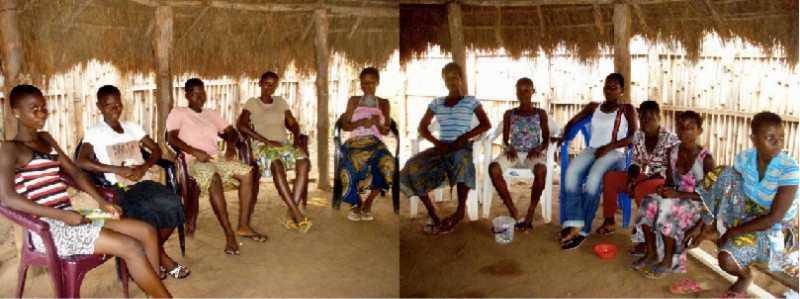
Girls in the young women's group I created and led. These women, along with peers and adult representatives from the township, would lead these projects.
I plan to work with students and young adults to help them build leadership skills to take charge of the film club, and to contribute to furthering the education of their peers and community members. Youth will generate awareness in the township, then screen these films during the summer months, and hold discussions afterwards. These discussions will be key in circulating new ideas for local entrepreneurship to improve the employment prospects of the youth. This African film club presents a complementary form of education that can inspire youth to become creative about the ways in which they choose to live their lives and rebuild their communities. During each screening, a small contribution of 25 francs per individual attending will help to further expand the club.
Solar Energy Component of the Education Project
Instead of using a television and a fuel guzzling generator in a village with no electricity, this project has an eco-friendly way of enhancing the quality of formal and complementary education. A locally produced solar powered light and projector system will be used to screen the movies. This project was proposed by one of SOLERGIE's Togolese solar panel engineers, Bienvenu. SOLERGIE is a Belgian trained and funded organization originally located in the headquarters of CADO as Solar Without Borders, and is now in Kpalime, the closest city 20 km from Agou-Yiboé. Youth who are considering pursuing engineering will intern with solar panel engineers to oversee the installation of the panels, lights, and projectors for the film club.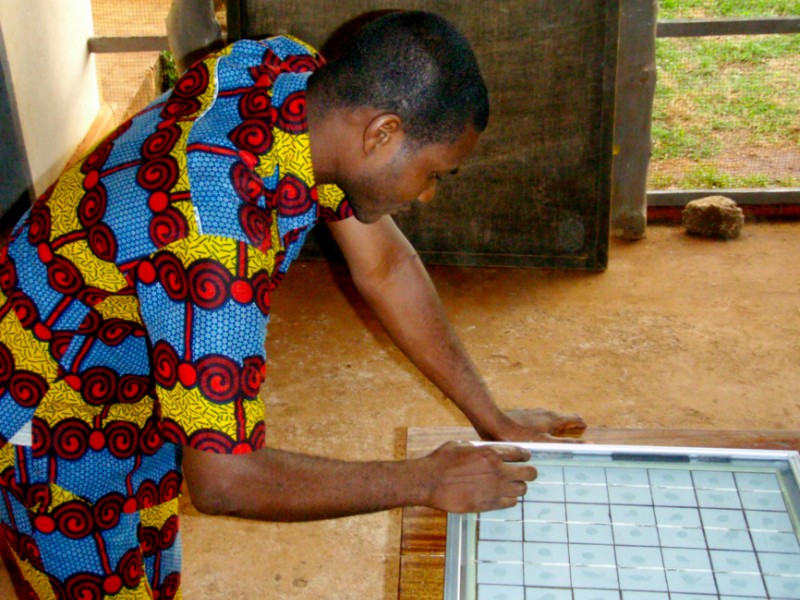
Bienvenu building a small, family-sized solar panel.
Project Expansion
If successful, these projects have huge possibilities for expansion in the region. As the youth film club generates income, it will spread and expand to other villages. The presence of 300 water filters will generate interest from neighboring villages and farms struggling with similar difficulties. The population of the Agou Prefecture is estimated at 79,247 inhabitants, with an annual growth rate of 2.33% (National Statistics Office, 2010 Census). 90% of the population lives in rural settlements, and the population is young; therefore, career building opportunities are beneficial for the majority of the population. After laying the foundation with this project, I plan to formally register a non-profit organization with annual projects that will bring American interns to Togo each summer, and will fund and manage key projects on the ground.
Funding Logistics
All donations through this website will be deposited directly into a small business account. Please keep contributing while I am away. The money from the website is deposited automatically into the project's business account and will go straight to project overhead costs while I am on the ground. If you have questions or ideas regarding my projects or would like me to send you further details on the budget and project plan, please email me. Again, here is the link to my comprehensive 47-page research thesis where you will find additional background and details on the projects.
Ways You Can Help
Please consider making a donation to my project in whichever way you feel you can best contribute: money, time, ideas, contacts, expertise, sharing the website link with your network, participating in fundraising activities, etc. If you would like to donate to a specific project, please select one of the options above, or email me and indicate which part of the project you would like to donate to. All funds donated through the website will benefit the project directly. My own travel and hospitality expenses are not included in this budget. As you can imagine, the costs of such a trip can be quite high. If you are interested in donating towards my airfare, transportation, food, housing, medical, and insurance costs, please contact me directly.
How will I guarantee your money is being spent appropriately?
You can keep up with my fundraising efforts and progress on this website, where I will post regular updates. All financial transactions will be recorded under the business account and you can request to see a statement. I will be transparent with the project planning and budgets; please email me to request access to these documents as they are developed. I will document the project from beginning (planning phase) to the end (evaluation) in writing and photos. My counterparts in Togo will perform follow-up evaluations 3 months after completion of the projects. After the evaluations I will compile and analyze the information into a report, and my presentation will be made available to donors.
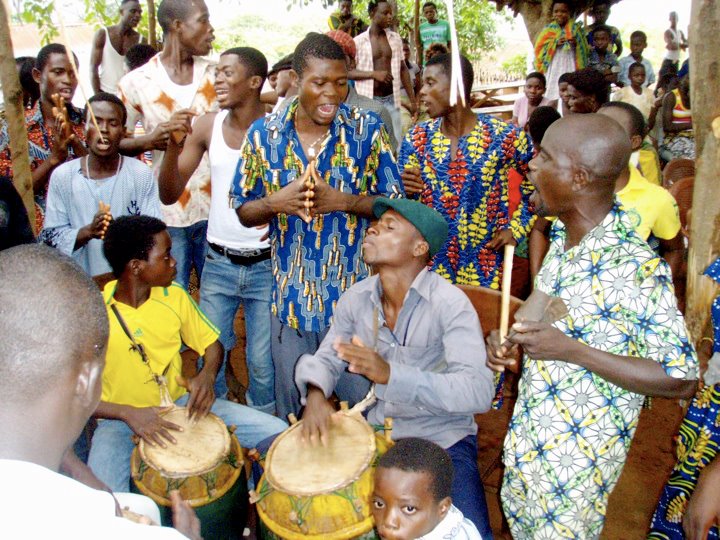
Traditional music and dancing during a religious holiday in the mountain village of Petsi.
Thank you very much for your time and consideration. No matter the size, your gift will help us reach our goal to impact the lives of over 1,000 people.
Warm regards and best wishes,
Ariane
After a three-month, self-designed internship in French-speaking Togo, West Africa (map) in 2011 followed by two years of research, I identified health and education as the most important needs in the township I visited, and began building these two projects. I am launching this website on my birthday, because what I would like most this year is the funding and support needed to carry out these projects from beginning to end. The budgets for my water filter project and educational youth film club are $10,000 and $5,000, respectively. Combined, these projects are in need of $15,000. The two projects are integrated, comprehensive, and affordable. They will be locally led, and self-sustained. Both will reach a large population with continued expansion and provide local educational and leadership opportunities on every level.
Why am I interested in Togo and Francophone Africa?
I am drawn to Francophone West Africa because village and farm communities survive despite the constant struggle for basic necessities like food, water, shelter, and good health. Reading the blogs of Peace Corps volunteers in Togo, Benin, Burkina Faso, Mauritania, Rwanda, and others has made a lasting impression on me, and I became concerned about poverty at the most extreme level. These volunteers generally live in impoverished, rural communities where local families help each other in times of crises and communities collaborate to make important decisions, like what to do when the last well runs dry. Love and generosity are as valuable as gold in societies with little material wealth and where community members depend on each other for existence. In many of the villages, animals run free and houses are made from mud and straw; a large percentage of their food is locally produced, from staples like corn and cassava to local specialties like palm wine and Togo gin. I began studying the history, sociology, geography, economics, politics, and culture of West Africa, and received funding from Mount Holyoke College to design my own summer internship. May to August 2011 I traveled to Togo, a politically peaceful country, eager to learn about a culture different from my own, and built around values I admire.
All photos on this page were taken by me, Ariane Khalfa, in the summer of 2011 in the township of Agou-Yiboé, Togo.

Photo taken from motorcycle on the road leading to Mount Agou.
My Research in the Township of Agou-Yiboé, Togo
I spent 3 months interning with the Center for Assistance to the Deprived and Orphaned (CADO), referenced in this article, a legally recognized Togolese non-profit and Non Governmental Organization (NGO), based in the remote, tropical village of Avedje at the foot of Mount Agou in southern Togo. I wanted to hear opinions and suggestions on local development initiatives from the most vulnerable members of the community, so I collaborated with a Togolese colleague from CADO, Alain Koku Degboe. Together, we designed a survey and interviewed 250 women in the township's 6 villages and 5 farms to determine family and community difficulties and the solutions they envisaged to bring them closer to their goals. The women's highest demand was to have clean drinking water (66% of 152 women interviewed, and 89% of all women from the 5 farms). Click here for a table of these results, to read a personal story about the conditions I witnessed, and for photos and more information about local water and sanitation conditions including waterborne illnesses in the region. This study led me to conduct further research and to finalize a 47-page thesis on education in Togo including a comprehensive community development plan for the township of Agou-Yiboé.

Interviewing women in the mountain village Blakpa. Sitting next to me is Alain Koku Degboe, my Togolese colleague and interpreter.
After finishing our surveys in 6 of the township's villages, we interviewed women in 5 remote farms where I witnessed a whole new level of poverty. The farms are much more difficult to access than the villages, and none of them have functioning wells. Instead, the farms rely entirely on water from the Zio River and small streams. Garbage, animal and human waste, and pesticides constantly pollute the river. Water around the riverbanks stagnates, increasing the spread of waterborne diseases and providing breeding grounds for mosquitoes.

The swampy path from Avedje, worsened by the rainy season, on the way to Makoumavo, one of the farms.
For drinking purposes, women in the farms currently filter water from the Zio River with a piece of cloth in attempt to remove the largest dirt particles before consumption. However, for bathing, cleaning, and washing dishes, the water is left as-is. Parasitic diseases, particularly malaria, affect 78% of the population. The area's most severe health problem directly related to water and sanitation is diarrhea, sometimes to a deadly degree, and other illnesses such as trachoma, hepatitis A, typhoid, Guinea Worm, schistosomiasis, onchocerciasis, and several other parasitic diseases are common as well.

This small stream is a source of water for the village of Petsi.
Project #1 - Water Filter Project
Locally made ceramic water filters are presently the most immediate, affordable, and ecological solution to convert contaminated water into safe drinking water, help prevent diseases, and save the lives of susceptible children. $10,000 is needed to supply 300 locally made ceramic water filters to the 5 most remote farms in the township of Agou-Yiboe in Togo, West Africa. These filters will provide 300 households with safe, clean drinking water. The average household size in the Agou Prefecture is between 5.5 and 12 people. According to the most conservative population estimates for the farms, anywhere between 1,094 and 1,860 people would have access to these filters in the farms Donomade, Ananivikondji, Makoumavo, Zionou, and Makavo. Because of the communal-style living, if needed, two households may share each filter, thus resulting in more people having access to clean water. During our survey, an overwhelming majority of women expressed support for this project, and indicated willingness to contribute financially to a percentage of the cost of a filter. This contribution ultimately lowers the cost of fundraising while giving families ownership of their filters. While the families may be contributing toward a percentage of the cost of the filters, they will need assistance funding crucial transportation costs, border fees, events to raise awareness, distribution, training, and essential follow-up evaluations.

Bienvenu displaying one of PHW's original ceramic pot Kosim filters. PHW now distributes AfriClay filters.
The water filters are manufactured, sold, and distributed by Pure Home Water (PHW), a social enterprise and legally recognized non-profit based in Tamale, northern Ghana. Watch the video on PHW's website to learn more about why this filter is ideal. The filter consists of a locally produced ceramic pot, plastic safe-storage container, top ring, lid, tap, brush, instruction sheet, and one Aquatab. If correctly operated and maintained, it has a proven life span of 3-5 years. Volunteer members of the community including women and youth will be designated as key leaders to represent their village/farm and train residents in water filter use and maintenance. Click here for more information about the water filter's history and effectiveness, and logistics for transportation, distribution, and training.
Project #2 - Educational Youth Film Project
"One's mind, once stretched by a new idea, never regains its original dimensions." - Oliver Wendell Holmes.
In conjunction with the water filter project, I have designed a complementary education project, which has a smaller budget and the potential to generate a small income to sustain itself annually. The $5,000 would be an initial investment to jump-start the club, where regional African films and documentaries are screened in villages followed by facilitated discussions. These are francophone African-made films reflecting on similar hardship situations faced by communities in rural Togo. I have compiled a list of approximately 20 films from various African Studies classes, and will be consulting with African Studies and Film professors as well as seek suggestions from the public to revise the list. These films have educational value and provide new knowledge and a new perspective on the problems faced in the community. They have the potential to open minds, prompting villagers to think of creative and entrepreneurial solutions to their difficulties. This project is aimed at stimulating village dialogues and inspiring the youth to become leaders for catalyzing change in their communities during their summer school break. This is an opportunity for communities to be introspective and embrace their local traditions and values while adapting to the ever-evolving, globalizing world. For my thoughts on education in Togo, and to see photos of children in the township who would benefit from this program, click here.

Girls in the young women's group I created and led. These women, along with peers and adult representatives from the township, would lead these projects.
I plan to work with students and young adults to help them build leadership skills to take charge of the film club, and to contribute to furthering the education of their peers and community members. Youth will generate awareness in the township, then screen these films during the summer months, and hold discussions afterwards. These discussions will be key in circulating new ideas for local entrepreneurship to improve the employment prospects of the youth. This African film club presents a complementary form of education that can inspire youth to become creative about the ways in which they choose to live their lives and rebuild their communities. During each screening, a small contribution of 25 francs per individual attending will help to further expand the club.
Solar Energy Component of the Education Project
Instead of using a television and a fuel guzzling generator in a village with no electricity, this project has an eco-friendly way of enhancing the quality of formal and complementary education. A locally produced solar powered light and projector system will be used to screen the movies. This project was proposed by one of SOLERGIE's Togolese solar panel engineers, Bienvenu. SOLERGIE is a Belgian trained and funded organization originally located in the headquarters of CADO as Solar Without Borders, and is now in Kpalime, the closest city 20 km from Agou-Yiboé. Youth who are considering pursuing engineering will intern with solar panel engineers to oversee the installation of the panels, lights, and projectors for the film club.

Bienvenu building a small, family-sized solar panel.
Project Expansion
If successful, these projects have huge possibilities for expansion in the region. As the youth film club generates income, it will spread and expand to other villages. The presence of 300 water filters will generate interest from neighboring villages and farms struggling with similar difficulties. The population of the Agou Prefecture is estimated at 79,247 inhabitants, with an annual growth rate of 2.33% (National Statistics Office, 2010 Census). 90% of the population lives in rural settlements, and the population is young; therefore, career building opportunities are beneficial for the majority of the population. After laying the foundation with this project, I plan to formally register a non-profit organization with annual projects that will bring American interns to Togo each summer, and will fund and manage key projects on the ground.
Funding Logistics
All donations through this website will be deposited directly into a small business account. Please keep contributing while I am away. The money from the website is deposited automatically into the project's business account and will go straight to project overhead costs while I am on the ground. If you have questions or ideas regarding my projects or would like me to send you further details on the budget and project plan, please email me. Again, here is the link to my comprehensive 47-page research thesis where you will find additional background and details on the projects.
Ways You Can Help
Please consider making a donation to my project in whichever way you feel you can best contribute: money, time, ideas, contacts, expertise, sharing the website link with your network, participating in fundraising activities, etc. If you would like to donate to a specific project, please select one of the options above, or email me and indicate which part of the project you would like to donate to. All funds donated through the website will benefit the project directly. My own travel and hospitality expenses are not included in this budget. As you can imagine, the costs of such a trip can be quite high. If you are interested in donating towards my airfare, transportation, food, housing, medical, and insurance costs, please contact me directly.
How will I guarantee your money is being spent appropriately?
You can keep up with my fundraising efforts and progress on this website, where I will post regular updates. All financial transactions will be recorded under the business account and you can request to see a statement. I will be transparent with the project planning and budgets; please email me to request access to these documents as they are developed. I will document the project from beginning (planning phase) to the end (evaluation) in writing and photos. My counterparts in Togo will perform follow-up evaluations 3 months after completion of the projects. After the evaluations I will compile and analyze the information into a report, and my presentation will be made available to donors.

Traditional music and dancing during a religious holiday in the mountain village of Petsi.
Thank you very much for your time and consideration. No matter the size, your gift will help us reach our goal to impact the lives of over 1,000 people.
Warm regards and best wishes,
Ariane
Organizer
Ariane Khalfa
Organizer
San Francisco, CA
Begin your fundraising journey


